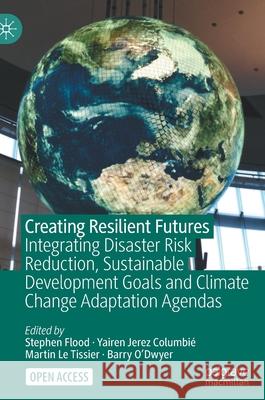Creating Resilient Futures: Integrating Disaster Risk Reduction, Sustainable Development Goals and Climate Change Adaptation Agendas » książka



Creating Resilient Futures: Integrating Disaster Risk Reduction, Sustainable Development Goals and Climate Change Adaptation Agendas
ISBN-13: 9783030807900 / Angielski / Twarda / 2021 / 259 str.
Creating Resilient Futures: Integrating Disaster Risk Reduction, Sustainable Development Goals and Climate Change Adaptation Agendas
ISBN-13: 9783030807900 / Angielski / Twarda / 2021 / 259 str.
(netto: 192,11 VAT: 5%)
Najniższa cena z 30 dni: 192,74
ok. 22 dni roboczych
Dostawa w 2026 r.
Darmowa dostawa!
Chapter One: Introduction: Editorial team
Chapter Two: Integration: building capacity and making connections
Stephen Flood, MaREI Centre, UCC, Yairen Jerez Columbié, MaREI Centre, UCC Stephen.flood@ucc.ie
Chapters Three to Thirteen
The eleven case-study chapters will provide a range of examples that underpin the aims and objectives of the book. These chapters take an international perspective with examples from Europe, Australasia, the Caribbean, and Africa.
Stephen Flood has over 12 years’ experience in climate change, environmental policy and social science research. His research interests include climate information platforms, serious games, climate adaptation implementation, resilience and systems thinking, coastal management, vulnerability assessment and hazard management. He has worked as a Postdoctoral Fellow at the Climate Change Research Institute at Victoria University of Wellington in New Zealand, as an Environmental Social Science Researcher at Landcare Research also in Wellington (2016 to 2018) and as a Senior Postdoctoral Scientist at the SFI Ireland Centre for Energy, Climate and Marine Research and Innovation (MaREI), at University College Cork. He is currently based at the Irish Climate Analysis and Research Units (ICARUS), Department of Geography, Maynooth University, working on a range of projects focused on various aspects of climate change adaptation and resilience.
Yairen Jerez Columbié is an Assistant Professor in Latin American Studies and Intercultural Communication at Trinity College Dublin, where she investigates cultural exchange, postcolonial ecologies and the sociohistorical and cultural dimensions of environmental challenges. Her work focuses on marginalised knowledge, cultural exchanges, postcolonial socio-ecological systems and ecocritical approaches in Latin America, the Caribbean and the Atlantic World. She has also carried out interdisciplinary work at the SFI Ireland Centre for Energy, Climate and Marine Research and Innovation (MaREI) and lectured at the Department of Spanish Portuguese and Latin American Studies at University College Cork. She is the author of the monograph Essays on Transculturation and Catalan-Cuban Intellectual History (Palgrave Macmillan 2021)
This excellent text recognises that efforts towards improving development outcomes must work in concert with strategies which promote planetary health and support the transition to a sustainable and climate-resilient future.
— Rt Hon Helen Clark, Patron, The Helen Clark Foundation, Auckland, New Zealand.
The threat multiplier of climate change is carefully used to examine best practice in a series of excellent case studies exploring the three related responses of disaster risk reduction, sustainable development and climate change adaptation.
—Emeritus Professor John Sweeney, Irish Climate Analysis and Research UnitS (ICARUS), Maynooth University, Ireland
This book provides concrete examples, through case studies from Ireland and around the world, to help illustrate what it means to think and act simultaneously on development, disasters and climate.
— Dr. Lisa Schipper, Environmental Social Science Research Fellow, Environmental Change Institute, University of Oxford, United Kingdom.
This open access edited volume critically examines the coherence building opportunity between Climate Change Adaptation, the Sustainable Development Goals and Disaster Risk Reduction agendas. The authors consider opportunities to address the global challenge of developing resilience, as an integrated development continuum instead of through independent and siloed agendas.
Stephen Flood is an environmental social science researcher working on various aspects of climate change adaptation, sustainability and resilience. He is based at the Irish Climate Analysis and Research Units (ICARUS), Maynooth University.
Yairen Jerez Columbié investigates cultural exchange, postcolonial ecologies and the sociohistorical and cultural dimensions of environmental challenges. She is an Assistant Professor in Latin American Studies and Intercultural Communication at Trinity College Dublin.
Martin Le Tissier is the lead PI for the Identifying Interactions for SDG Implementation in Ireland and Achieving Resilience in the Marine and Coastal Environment of Ireland EPA funded projects based at MaREI.
Barry O’Dwyer is lead researcher in the area of impacts and adaptation at MaREI and is leading the development and delivery of Climate Ireland, Ireland’s national resource of climate change and adaptation information.
1997-2025 DolnySlask.com Agencja Internetowa
KrainaKsiazek.PL - Księgarnia Internetowa









